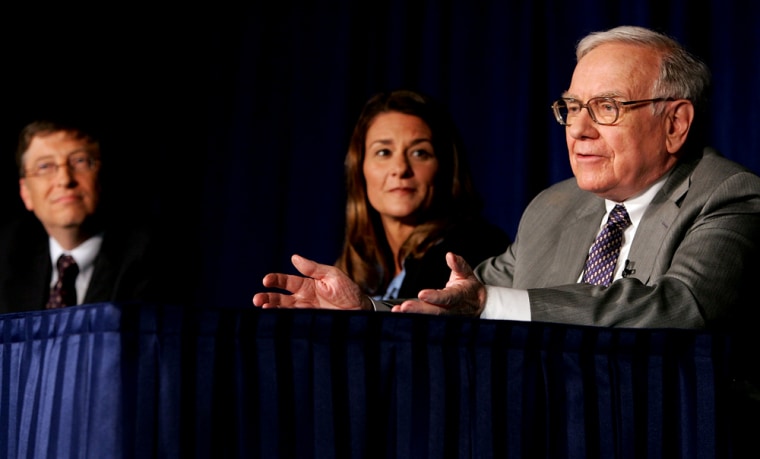A philanthropic merger between Warren Buffett and Bill Gates, the world’s two richest men, sets a new benchmark for the wealth others may donate and the businesslike scrutiny they will demand over those funds.
Buffett on Monday signed over much of his $44 billion fortune to the Bill & Melinda Gates Foundation as part of the single-largest act of charity in U.S. history. The contribution would double the foundation’s assets to more than $60 billion.
In doing so, Buffett said it was much harder to give money away responsibly than to amass it in the first place.
“Philanthropy is a tougher game and really the search for talent to perform in that area should be more important (than in business),” Buffett said in a town hall meeting with Bill and Melinda Gates in New York.
The move may prod even the most miserly of moneybags to reach into their pockets for society, as well as stoke a culture of competitive giving between the fiercest of business rivals, according to philanthropy experts.
“It’s going to cause a lot of other people to think about what’s the most effective way to become a philanthropic player,” said Ray Horton, director of the Social Enterprise Program at Columbia University’s business school.
“I would think the 49 other people (on the list of the world’s richest) are all thinking about this issue today.”
Buffett’s decision also taps into a new infrastructure of charity, in which a growing number of business school graduates use their skills for nonprofit work while corporations take a more active role in social welfare.
“You will see others who will give to them (Gates),” said Carol Cone, founder of the Cone Inc. marketing agency that links companies with charitable causes. “I also think there’s going to be a mirror response where you will see other very innovative philanthropies being developed as peers of Bill Gates.”
Buffett said his decision was influenced by Gates’ plan to devote himself to charity full time in two years, applying the acumen that helped create software giant Microsoft Corp. to fighting poverty and improving education.
“We look for management in place and then join with them,” Buffett said, explaining his trust in Gates as little different from the strategy that helped him build Berkshire Hathaway Inc. into a $142 billion insurance and investment company.
The risk of arrogance
Gates’ corporate competitors like Apple Computer Inc.’s Steve Jobs might consider recruiting other technology billionaires for a large philanthropic imprint, experts said.
Wealthy leaders from other industries, such as Viacom Inc. Chairman Sumner Redstone, may be inspired by Buffett’s trust in Gates for making a large donation.
The amount and manner of charitable giving has changed drastically in the last 10 years. Assets of high net worth individuals rose to more than $33 trillion in 2005, according to a report by Merrill Lynch and Capgemini.
That amount of wealth, coupled with the greater sense of societal responsibility seen by Columbia’s Horton and others, could translate into an unprecedented level of charitable giving over the next two decades.
But the application of goal-oriented business expertise to societal problems carries its own risks if the goal can’t be met easily or quickly — particularly when the sheer amount of assets applied is concentrated in the hands of a wealthy, perhaps impatient few.
“One of the things business does best is measure (results). It can be brutal,” said Peter Karoff, chairman of The Philanthropic Initiative in Boston. “If you move too far into the corporate model you move away from the mission and the soul and the spirit of what one needs.”
Karoff advises the rich on choosing charitable causes.
“I know of very large donors who have acted with imperviousness and arrogance,” he said. “Where is the democracy ... even if you agree with what they are doing?”
Large-scale giving may also not be as easy as an outsider would imagine, experts said. Oracle Corp. founder Larry Ellison recently made headlines for not making good on a $115 million pledge to Harvard University, though the software billionaire did not give an explanation.
“A lot of billionaires are highly illiquid because they own a lot of private companies,” said Matthew Miller, editor of Forbes magazine’s list of the 400 richest Americans. “These people have to borrow against their holdings to have a billionaire lifestyle.”
